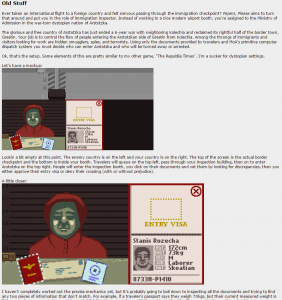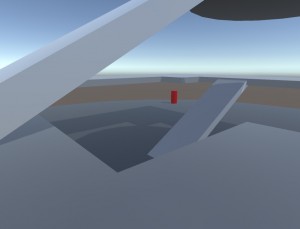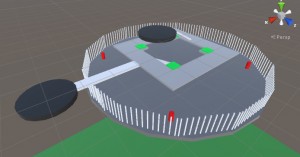Final source for Intangible from Qiaochu (Mac) Li.
The attachments are the alpha version of my game. Sorry that I can’t be present in the class. It will be very helpful if you play it and leave comments on this post. Thanks.

Life Experience:
As an American living in Japan, Pope dealt with immigration in his international travels and thought the experience, which he describes as “tense”, could be made into a fun game. Before release, Pope had set up a name submission form for the public, where people could submit their own names to be randomly assigned to scripted characters in the game.
Technical Background:
Lucas’s strong technical background ensures him freedom to create innovative and complex gameplay experience.

Iterations:
Iterations on details make Paper, Please outstanding.

Working Title: Sky Prison
Description: Sky Prison is a first person puzzle game. The player starts from a prison trapping him in the sky. The prison has 3+ floors and a very unique rule about visibility. The unique rule is that important items can only be seen when you stand higher than them. It is the key point to solve the puzzles and escape from the prison. In the end, the player jump out of the prison and falling back to the appealing ground. Unfortunately all objects disappear on the ground due to the unique rule in this world.
Mechanic Example:



Statement: The game focuses on how to develop a world based on a uncanny rule which is not existed in the real world.
Reference:
It is a game about a gem and the people it meets. In sum, there are three characters the gem can meet, a boy, an alien, and another gem. Created by Qiaochu (Mac) Li.
Update: A quick fix for the alien crush bug.
I had killed thousands of lives in virtual world. I killed them using cold weapons in Mount & Blade. I gave them head shots in Call of Duty. I teared them into pieces by my magics in World of Warcraft. I killed them so I won and got promotions, rewards, and more power. I got everything in these worlds by killing. So in these world we are killing for fun. The mechanics and systems behind these games are designed to encourage killing in certain areas and circumstances. So in these kind of games, I don’t remember how many lives taken away by me because I kill everyday and the lives are actually similar to my character.
Then I met sandbox games. In Skyrim, Fallout New Vegas and Watch Dog, mechanics and systems provide more variations on solving a problem. You can choose to kill since that is the most traditional way. But you have other options, such as bribe and persuasion. Compared to the games mentioned in the last paragraph, these games are less violent and more optional. Still, I don’t remember how many lives I killed too because killing is just one way to solve a problem (mostly a task) in the worlds. I am care about finishing a task instead of my way to finish it.

However, I killed an old man in This War of Mine. I killed him in a game one month ago but I still remember all the details of my behaviors and my mental process. And I still feel guilty. I Let me tell you that. My character was a cooker at that night, one of my companions was in charge of night watching at home and the other one was badly sicked in bed. I was going outside to scan for resources. I need food for my group and I need medicine to save my companion. Hospital was taken up by a group of soldiers so I had to test my lucks on an shabby building. It was said that there are foods and medicines but dangers as well so I took my pistol. Entering the building is pretty simple because it is a big building and few people lived here. I tried to be polite at beginning avoid entering the room which is taken up by others. I scanned for hours but failed to find anything useful. Even my character were murmuring that he is hungry. So I decided to take a risk. I entered a kitchen which is obviously belong to someone else. Then I got some food successfully and no one spotted me. Since I had stolen something, then I think I should steal more since there was already a penalty for stealing. So I walked around and entered a bedroom. All I spotted was the clear icon floating on the bed which showed that there was items inside. So I clicked that and my character found medicines! Oh, I can save my companions life! I took them. Suddenly, a dialogue popped out, “Don’t take the medicine. I need them”. Then I found that there is an old man lying on the bed. Obviously, he was ill. Actually, in the game, I always try to help others. I traded my medicine to one of the son whose father is ill to save his life. I went outside to help my neighbors. But now I was taking other’s medicines, I was taking his life supplements away. Without any hesitation, I pulled out my gun and shot at his three times before he died. I run away and back to home. Finally, my companion still died in sickness because it was too severe and I was killed when suffering a robbery later.
Why I kill that old man? I keep thinking about it. Rationally, killing a non-enemy using bullets is a waste of bullets and they are precious in the game. The instant thought is that I took his medicine so he would die. I was just try to make it easier. It was nice to him. But now I can admit that I killed him because I felt guilty to steal his medicine and his existence was evidence of my guilty. So I killed him for my own relief.

Emotions in game are precious and important. So one interesting question is why I feel guilty to that exact old man instead of the former bodies on my game experience path. I consider the followings might be part of the reasons.
First, in This War of Mine, there is no exact goal for players. Players struggle with survival everyday, but the game never says that is your goal. Without a goal, players cannot blame killing to game. They have to take their own responsibility for their own behaviors.
Second, when a character kill someone his mood and his companions’ and his moods will be low for several days. Exposed to others makes players more affected by social opinions.
Third, NPCs are responsive to the world. If the old man was just lying down or kept saying before I took medicine. I won’t feel he reacted to my behavior. Then I do not care about him any more.
Fourth, I died from robbery from someone else. I feel the hopelessness when suffering it.
In sum, This War of Mine provides a successful example of how to create a realistic and impressive world by an innovative way, evoking emotions.

The Floor Plan is a text-based exploration game. The player walks into a weird house and tries to reveal the unique physical principles inside it. To finish the game, the player needs to find a right way to escape from the house.
http://qiaochuli.com/Story/TheFloorPlan_v2.1.html
By Qiaochu (Mac) Li